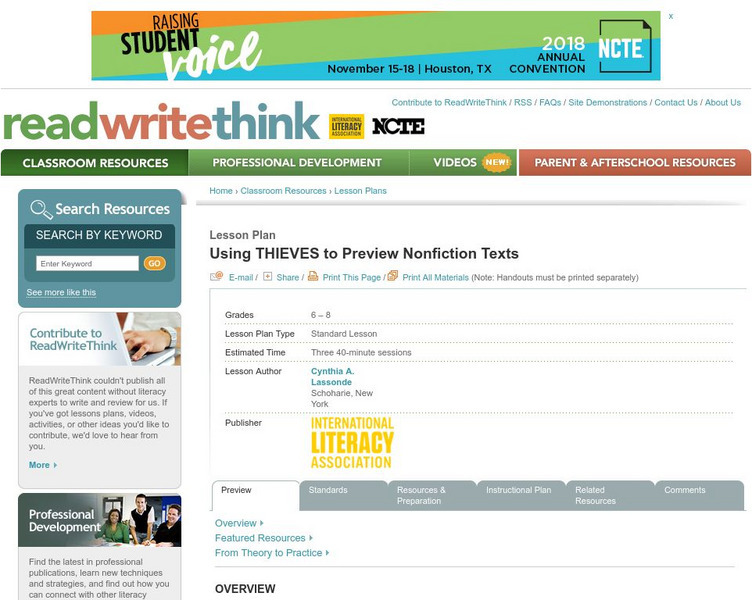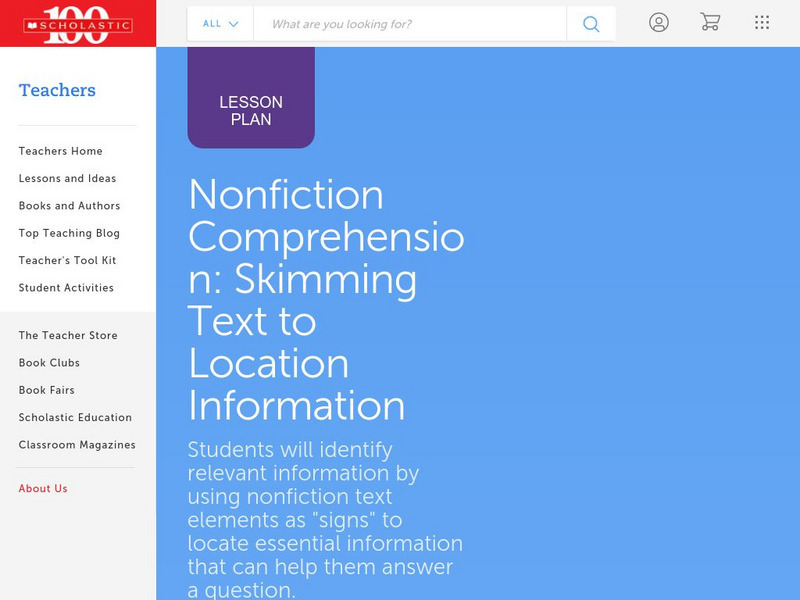Curated OER
Earth Day
Third graders utilize technology to access, analyze, interpret and communicate information about Earth Day.
Curated OER
Beneath the News: Who's Doing What to Whom, and Who Cares?
Students investigate the differences between various forms of media (print, radio, TV, Internet). They determine the target audience for each and compare exposure around the world. They write a short story and share it with the class.
Curated OER
Seeing Is Believing
Students research and describe the stories of Thomas Jefferson, Meriwether Lewis and William Clark. They analyze historical sources from different points of view and present an analysis of two historical contexts.
National First Ladies' Library
Are We There Yet?
Pupils study the wide-reaching effects of the Cold War, even to its involvement in domestic road construction. They research the National Defense Highway System (Eisenhower Highways) for information about the creation of the program, the...
National First Ladies' Library
Fitness for Life
Students discuss their favorite activities and determine which activities are suitable for older people. In groups, students research the benefits of aerobic exercises and the equipment needed. Students share their information with the...
Curated OER
A Sense of Place
Students identify and describe one or two places significant to them using vivid language. They describe one of those important places in accurate, evocative language showing an original perspective.
Curated OER
Memories
Fifth graders collect artifacts of their fifth grade school year and make a technology based Memory Book.
National First Ladies' Library
Jefferson's Legacy: A National Library
Students examine the creation of the Library of Congress. They investigate reasons why Thomas Jefferson sold his personal collection to the Library. Employing various research resources, students write newspaper articles about the sale...
Curated OER
The Time I Got Lost
Third graders go through the writing process but substitute paper and pencil with the computer to create a story about "The Time I Got Lost".
Curated OER
Rare, Fat, Flabby, Big-Mouthed Sharks
Learners research Megamouth Sharks and write paragraphs based on their findings.
Curated OER
Awesome Audio Book
Students choose a written piece and present it aloud in a student-made recording. They analyze how sounds are used to elicit emotion.
Curated OER
When Worlds Collide
High schoolers research on a focused topic. They gather information from a range of sources and orally cit it in a presentation. Students connect information acquired in previous lessons with research on the assigned topic. They research...
Curated OER
Language Arts: Survival Diaries
Students are able to compose a dialectical journal entry which analyzes information presented in a text. They are able to compose a creative journal entry which develops characters, presents events in logical order, and includes sensory...
Curated OER
K Is for Keelboat
Fifth graders investigate the significance of the keelboat in the Lewis and Clark expedition. They define the key themes of the expedition and classify them in prescribed format, an ABC book.
Curated OER
The Mysteries of Saturn and Cassini
Students examine photographs of Saturn and make observations. They develop questions they have based on viewing the photos. They work together to answer their questions.
Curated OER
Famous Virginians
Fourth graders research the lives of famous people from Virginia. Using the internet, they take notes in a blank flipbook given to them by their teacher. They write a speech in first person of the famous Virginian they researched and...
National First Ladies' Library
States' Rights: 1798-1860
Students develop an annotated timeline specific to the concept of States' Rights. They research an example to the doctrine noting how the ideas change and beome more specific as time passes and discuss their findings through class...
Polk Brothers Foundation Center for Urban Education at DePaul University
De Paul University: Center for Urban Education: Nonfiction Reading Strategy Assessment [Pdf]
This inventory provides questions to determine the habits that students use when reading nonfiction pieces. This inventory may be used at the beginning of the year or prior to beginning a unit that involves the reading of nonfiction texts.
ReadWriteThink
Read Write Think: Using Thieves to Preview Nonfiction Texts
Contains plans for three lessons that introduce a nonfiction prereading strategy with the acronym THIEVES, which stands for Title, Headings, Introduction, Every first sentence, Visuals and vocabulary, End Questions, and Summary. In...
Other
Ncrel: Reading Strategies: Before, During, and After [Pdf]
This page provides a detailed chart to aid students' understanding of texts. It goes through the steps of pre-reading, during reading, and after reading, outlining what students should be thinking about as they interact with a text. This...
Reading Rockets
Reading Rockets: 103 Things to Do Before/during/after Reading
The highly-respected Reading Rockets program offers both teachers and students a toolkit of ways to connect more actively with the materials they read. Some of these techniques are specifically for fiction-reading, others are designed...
Scholastic
Scholastic: Lesson Plan for Nonfiction Comprehension: Skimming Text
Build comprehension by developing reading strategies for use with nonfiction text. This lesson focuses on teaching students to recognize text elements as clues to help them quickly locate key information in text.
Utah Education Network
Uen: Using a Before Reading Organizer With Informational Text
This module provides strategies to use with informational text. Teachers will explicitly teach students about graphic organizers to use before reading informtational texts.
ReadWriteThink
Read Write Think: Anticipation Guide
Anticipating is an effective reading strategy for readers of all ages. Utilize this template and graphic organizer to help your students become better readers.









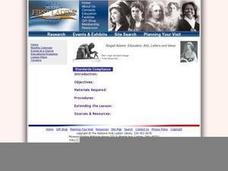


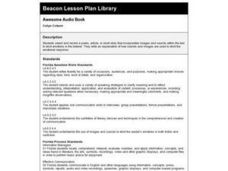


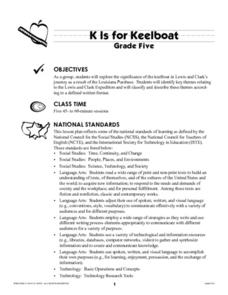



![De Paul University: Center for Urban Education: Nonfiction Reading Strategy Assessment [Pdf] Unknown Type De Paul University: Center for Urban Education: Nonfiction Reading Strategy Assessment [Pdf] Unknown Type](https://d15y2dacu3jp90.cloudfront.net/images/attachment_defaults/resource/large/FPO-knovation.png)
